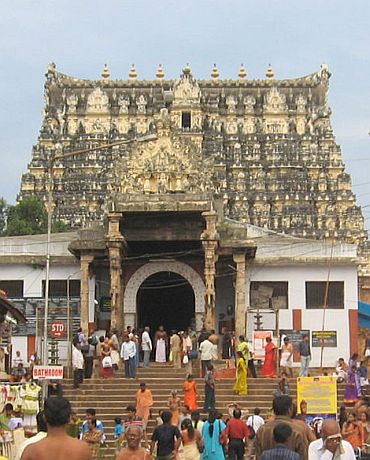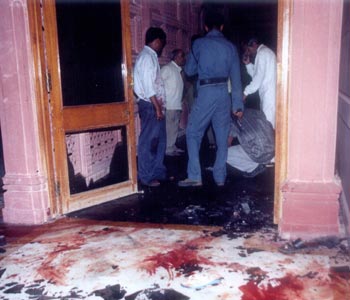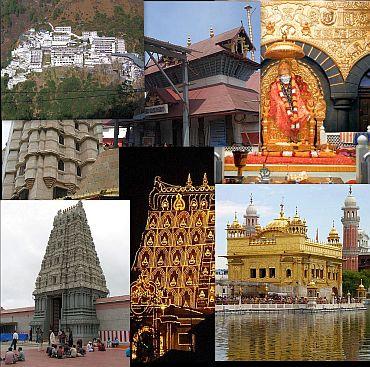
Vicky Nanjappa speaks to C D Sahay, former chief of the Research and Analysis Wing, who says terrorists have enough money, and once they are in the limelight after an attack the funds continue to pour in.
Will the revelation that Rs 90,000 crore lies at the Sri Padmanabhaswamy temple in Thiruvananthapuram, Kerala, give birth to more Ghaznis and Ghoris? History would show at that point of time these emperors looted temples since they were rich.
Now it has been pointed out by a couple of experts that making public such large amounts of wealth stashed away in temples would only attract terrorists. While this is one view, the Intelligence Bureau and the Research and Analysis Wing say that terrorists attack temples not with an intention of taking away its wealth but to create a social divide.
Among all the targets that are in place in India, intelligence agencies still rate places of religious worship high on the list. There have been many instances in the past to show that temples are terror targets and the Akshardham and Varanasi attacks are only proof of that. In addition to this, revelations by David Headley also reveal that he had surveyed a couple of temples which the Lashkar-e-Tayiba wanted to attack.
...

The question now is whether terrorists would attack places of religious worship for the money stashed in there or would it be to create a divide in society. C D Sahay, former chief of the Research and Analysis Wing says, "I don't think money would be criteria for terrorists in such cases. Temples are very high on the radar of these terrorist groups and every second ploy of theirs would involve a place of religious worship in it."
"I know that some people are claiming that revealing such wealth could attract terrorist groups. Although we need to be careful, I think it would be a bit far fetched to say that terrorist groups would try to rob the money in our temples. Research and the pattern with which these groups have been working have shown that their intention is more to create a religious divide and hence they chose to attack temples.
"They can also stage an attack to create havoc and this again would be on the context of creating a religious divide and not to escape with the wealth. It would be very difficult for them to do so," says Sahay.
"Another point I would make over here is which terrorist group today is short of cash? They have enough and more and once they are in the limelight the funds continue to pour in," Sahay said. Take for instance the London blasts and it has been revealed that the attack was carried out with 7,000 pounds. This is not big money for these terrorist organisations and they can arrange this in no time.
...

Sources in the Intelligence Bureau point out that guarding of temples is extremely difficult for security agencies. Devotees throng these places in large numbers and find it to be irritating to be frisked and checked at all times. A majority of our temples have bad security due to this reason and this attracts terrorist groups, as it makes it an easy target.
"Moreover, we have seen in the past that there has been a religious divide once a place of worship is attacked and these terror groups thrive on such situations. There is a need for the managements of these places to come forward and understand the grave threat there is to these places. More often than not, they are not too cooperative where security measures are concerned which only makes the job of security agencies even more difficult." Sahay said.
Sahay adds that terrorist groups have never believed in religious sanctity. However, more importantly, it is for the management to realise the importance of safeguarding the wealth which is a national treasure.
"When this news of the wealth being found came out, it worried me a great deal. The money is lying dead and this is a national wastage," says Sahay. "I am not saying that this money should be taken out and used right away. It is all contributed by the kings and instead the trust would do well to create assets," he adds.
"The artifacts that have been found should be put out on display in order to showcase our national heritage, so that people would get a better idea of what our civilization was like. Our temples not only represent our religion but also our national heritage," Sahay says.
...

While terror threats to the temples in Indian continue to loom large the biggest issue that we continue to face is that of bad security. Take the case when an intelligence alert was put out regarding the Madurai Meenakshi temple in Tamil Nadu. The security agencies found it extremely difficult to beef up security since the department for Hindu Religious and Charitable Endowments was not too forthcoming and providing details regarding the security.
Security experts point out this aspect and say that there is a tussle on since the department believes that it would cause a problem for the devotees who come to temples to worship and they would not want a security guard standing in between them and God.